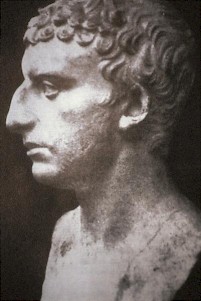Josephus' Jewish War
Josephus' Jewish War: main source about the Jewish revolt against the Romans (66-70), the destruction of Jerusalem (70), and the siege of Masada (74).

Flavius Josephus wrote first work, the Jewish War, in Aramaic, and presented it to the emperor Vespasian between 75 and 79. An assistant translated it into the language of scholars of his days, Greek; this second edition was dedicated to Titus, who had become emperor in 79. The seventh book of the Jewish War, which describes the fate of the Jewish prisoners and the fall of Masada, is a later addition. Its title is slightly misleading. The books not only tell the story of the war between the Jews and Romans, but also deal with the preceding period from 175 BCE.
It should be stressed that Josephus is, according to ancient criteria, an excellent historian. Authors like Polybius of Megalopolis and Lucian have published treatises on the writing of history, and Josephus lives up to the standards they set. He knows the country he is describing, he has experience as commander of an army, and he understands the issues of the war. Moreover, he interviewed representatives of both sides. This is more than can be said about his younger contemporary Tacitus, who is usually regarded as a greater historian. As we will see below, modern scholars have criticized Josephus, though.
The Jewish War was written under imperial auspices. Vespasian and Titus gave the historian access to the imperial archives and to the logbook of their campaign. This enabled Josephus to write a reliable story, even about events at places where he had never been. At the same time, imperial patronage made the story unreliable. Vespasian's bid for power is presented in a favorable way; Titus is a valiant warrior whose heroism is matched only by his kindness towards the victims of the war.
Flavius Josephus' kindness towards his Roman benefactors does not mean that he is negative about the Jews. On the contrary, he has pity with 'the innocent' in Jerusalem, who are trapped inside a city under siege and cannot leave. At great length, he describes the atrocities to which they are subjected.
But his sympathy does not include all Jews. The responsibility for all the bloodshed rests squarely on the shoulders of the people that he describes as 'brigands', 'madmen', 'desperado's', or 'bandits': those are the invectives he has in store for violent nationalists like the Zealots, the Sicarians, and men like John of Gischala. It is no coincidence that the Jewish War ends with a speech of the leader of the rebels at Masada, the Sicarian Eleazar, who more or less admits that all violence was a result of nationalistic agitation and also admits that God is angry. (The speech is, of course, written by Flavius Josephus himself. Almost no one survived the capture of Masada, and the historian can never have received a report of Eleazar's last words.)
The common people with their silly nationalistic ideas, their religious intolerance and their aggressive behavior are responsible for the disaster. The Jewish aristocrats - to which Flavius Josephus belonged - are of course not to blame for the war. The same applies to war crimes. These are invariably committed by the rank and file, never by their officers.
In the first century, there were serious economic problems in Judaea. The rabbinical sources indicate that the Temple authorities were widely regarded as corrupt. In this conflict between the rich elite and the poor peasants, the Romans sided with the elite, as they always did. Peasant resistance against the Temple authorities coincided with resistance against the Romans. The war that started in 66 was not only a national revolt against a greedy emperor and his tactless governor, but also a class war among the Jews. Josephus, like every aristocrat, had no real sense of identification with the dispossessed and oppressed peasantry; ultimately, he did not understand the true cause of the war he described.